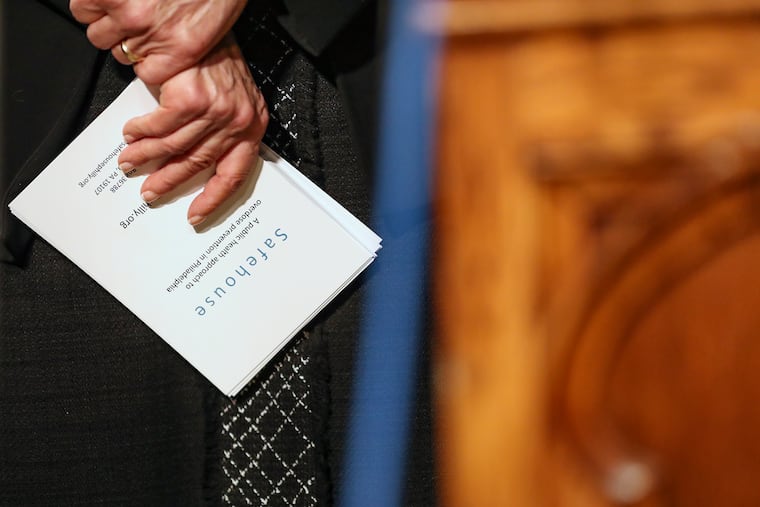Judge rejects latest bid to open a supervised injection site in Philadelphia
Judge Gerald A. McHugh ruled that religious beliefs do not allow Safehouse to skirt federal law, and dismissed the case.

A federal judge on Wednesday rejected the latest legal bid from the nonprofit that’s sought for years to open supervised drug consumption sites in Philadelphia, issuing a ruling that could deliver the terminal blow to its efforts.
In a seven-page opinion, U.S. District Judge Gerald A. McHugh quickly dispatched with arguments from the backers of the organization, Safehouse, who had maintained they were compelled by their religious faiths to try to save lives and prevent overdoses by operating facilities for people with addiction to use illicit drugs under medical supervision.
They argued that federal laws barring supervised injection sites violated their religious freedom.
But while McHugh acknowledged the “noble intentions” of Safehouse and its founders, he concluded that their Jewish and Christian beliefs did not give them license to skirt federal laws.
“The public health crisis they seek to address continues unabated,” the judge wrote. “But their religious inspiration does not provide a shield against prosecution for violations of a federal criminal statute barring its operation.”
» READ MORE: How do sites for supervised drug use work? A primer.
McHugh’s decision caps off a whipsaw legal battle that has drawn out over years and a heated public debate over the merits of Safehouse’s proposal amid an overdose crisis that killed a record 1,412 people in Philadelphia in 2022.
The nonprofit’s vice president, Ronda B. Goldfein, said she was disappointed in the decision and that the organization was considering its options for an appeal.
“Amid this crisis, federal and local government have not taken the steps to provide relief,” she said in a statement. “In the five years since we were [first] sued, 6,500 people died of overdoses in Philadelphia.”
A spokesperson for the U.S. Attorney’s Office in Philadelphia, which sued to block Safehouse from opening in 2019, declined comment on Wednesday’s ruling.
Under then-U. S. Attorney William M. McSwain, government lawyers argued that Safehouse’s proposed supervised consumption sites would violate a federal law, colloquially known as the “crackhouse statute,” that bans the operation of any space for people to use drugs.
McHugh initially sided with Safehouse, but his decision was overturned in 2021 by the U.S. Court of Appeals for the Third Circuit, which ruled that “Congress has made it a crime to open a property for others to use drugs, and that is what Safehouse will do.”
Safehouse returned to court later that year with its argument that the “crackhouse” law violated its backers’ religious rights. And despite months of settlement talks with Justice Department lawyers, those discussions ultimately broke down last year.
Meanwhile, City Council voted to override a veto from then-Mayor Jim Kenny to essentially ban any such site from operating in much of the city no matter what the court decided.
In his ruling Wednesday, McHugh noted that despite the religious freedom claims Safehouse was asserting, its founding documents make no mention of any religious mission and its tax filings seeking nonprofit status from the IRS do not set forth any religious purpose for the organization.
“The organizers and leaders of Safehouse profess religious motivations,” he wrote, “but the work of Safehouse itself is in no respect religious.”
Still, Goldfein pointed to the success of two supervised consumption sites that have operated without interference from authorities in New York, where federal courts have not yet been asked to rule on their legality
Those facilities, run by the nonprofit OnPoint NYC, have supervised drug use for more than 4,800 people and have prevented 1,400 overdoses since December 2021, according to the organization.
“They have connected people to treatment for substance use and mental and physical health needs and housing,” Goldfein said. “We could be doing the same in Philadelphia.”